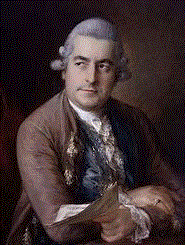
Composer of the month December is Carl Philipp Emanuel Bach, second son of Johann Sebastian. Carl Philipp Emanuel (1714-1788) worked from 1734 at the university of Frankfurt, where he wrote mostly instrumental music. As experienced musician he knew exactly what good musicians were capable of and the sort of music his boss wanted. At the same time he was a composer who knew the market, which wanted interesting but relatively simple music. Bach was a pragmatist and died wealthy.
Carl Philipp Emanuel was an expert in instrumentation and he liked changes of tempo, contrasts and unexpected changes of harmony. Through those characteristics he gave musical expression to a movement already present in literature: the Empfindsamkeit, with emphasis on overt emotions and powerful gestures. In this way he distanced himself from his father’s more level idiom.
In 1741 the composer went into the service of the noble flute player Frederik the Great of Prussia. Bach wrote primarily chamber music and did a lot of teaching. Several standard textbooks for singers and all sorts of instruments date from Bach’s Berlin period and Carl Philipp made a huge contribution with a book about keyboard playing which was much consulted long after his death and teaches us a lot about performance practice in the middle of the 18th century.
Passion for vocal music
Carl Philipp was famous in his time for his vocal music. He wrote more than forty Passions, lots of other religious pieces for choir plus many songs, some with a religious subject. His song Fürbitte des gekreuzigen Jesu für seine Feinde appeared in a collection of religious songs. The melody is simple, but not folk song. The piano part is simple and mainly supporting. Schubert’s song compositions were far off.
In his lifetime Carl Philipp Emanuel was more famous than his father. In the nineteenth century that turned around and his son only rose to prominence again after 1900.
Broadcast
Every work day from Wednesday 4th December 2019 from 16.00 to 17.00.








